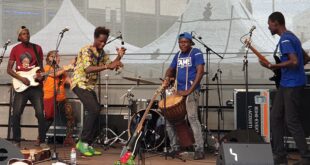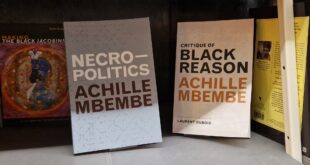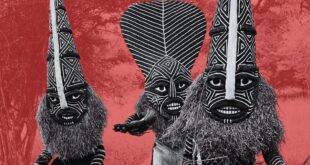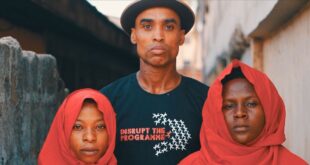Jules Shungu Wembadio Pene Kikumba
(14 June 1949 – 24 April 2016)
It was a terrible shock for the African and international music world when news about Papa Wemba’s passing away circulated around the globe on 24 April 2016. More so as it happened when he was in full swing during a performance at a festival in Abidjan on the night of 23 to 24 April.
Born Jules Shungu Wembadio Pene Kikumba on 14 June 1949 in the Kasai region of the then Belgian-ruled Congo, his mother being a “pleureuse” (professional wailer), he soon discovered his love for music. In 1969, he joined the innovative young band Zaiko Langa Langa, which ushered in a new era for Congolese music.
With his admirably unique, razor-edged and silky voice, he won over the audience in no time. And as he had a pioneering role in promoting the new musical style Soukous, which soon became the hype all over Africa, his band Viva la Musica, which he founded in 1974, was an instant success.
The band’s first hit, the lively dance number Ebalo Mbonge, was written by a young Koffi Olomide, who did his apprenticeship in the band under Papa Wemba’s tutelage.
Papa Wemba went from success to success and, among other projects, recorded three international albums for Peter Gabriel’s Real World Records label. Outside the world of music, he was an emblematic figure in the lifestyle movement SAPE (Société des ambianceurs et personnes elegantes), which embodies elegance in style and manners, and even starred as an actor in the film La vie est belle.
When Papa Wemba’s career seemed on an unstoppable way upwards, he had to serve a three-month prison term in France in 2004 for illegally bringing people into the country under the pretext that they were musicians. He maintained that he was duped into it and that he never took money for it. Reportedly, the bail that was demanded by the Belgian authorities in the same case was paid for by the DRC’s president, Joseph Kabila.
After these experiences, combined with the rise of new African styles such as “coupe-decale” from Cote d’Ivoire and the waning popularity of Congolese music outside the two Congos, we didn’t hear much of Papa Wemba in the following years.
Sadly, it was at his passing that the international media began to rediscover his work after 2004.
Thus, the old cliché must be used again: a musician may be dead, but he will live on in his music. And so will Papa Wemba. His friends and fans and the entire nation of the DRC won’t forget him.
Frank Stenner
 THE AFRICAN COURIER. Reporting Africa and its Diaspora! The African Courier is an international magazine published in Germany to report on Africa and the Diaspora African experience. The first issue of the bimonthly magazine appeared on the newsstands on 15 February 1998. The African Courier is a communication forum for European-African political, economic and cultural exchanges, and a voice for Africa in Europe.
THE AFRICAN COURIER. Reporting Africa and its Diaspora! The African Courier is an international magazine published in Germany to report on Africa and the Diaspora African experience. The first issue of the bimonthly magazine appeared on the newsstands on 15 February 1998. The African Courier is a communication forum for European-African political, economic and cultural exchanges, and a voice for Africa in Europe.


















